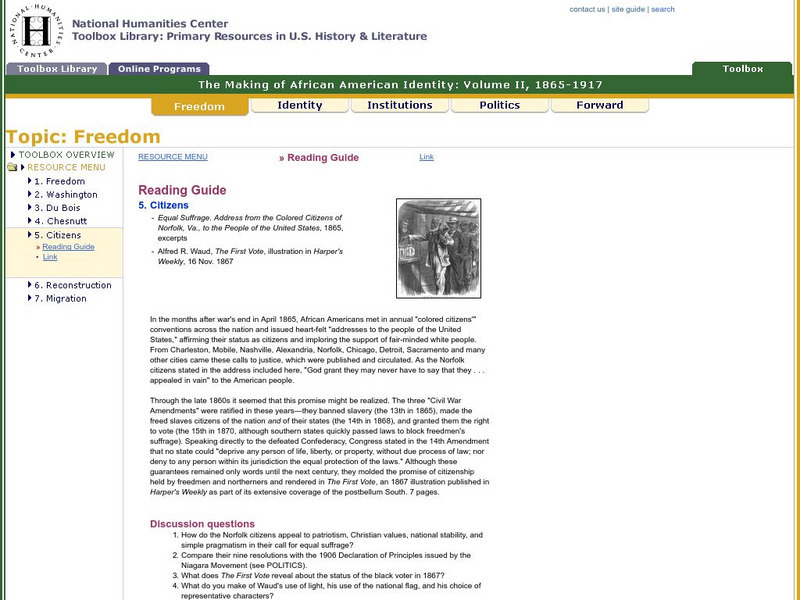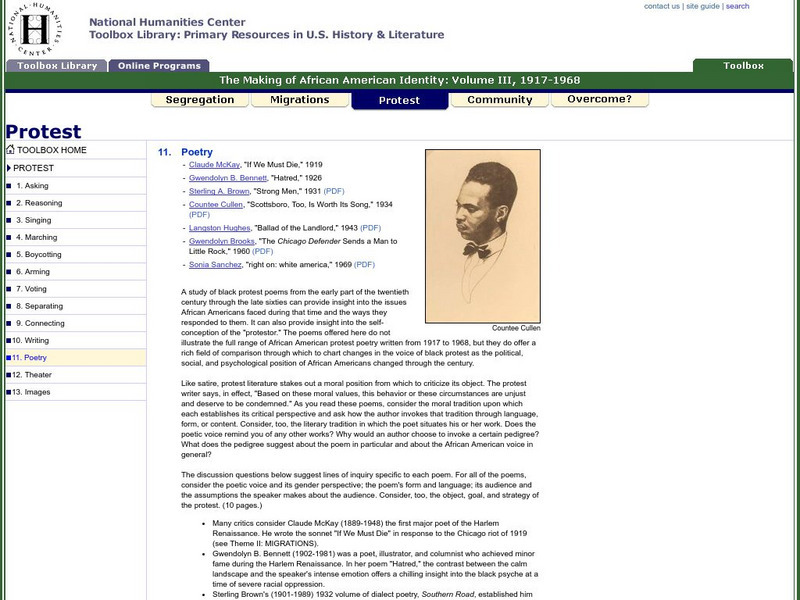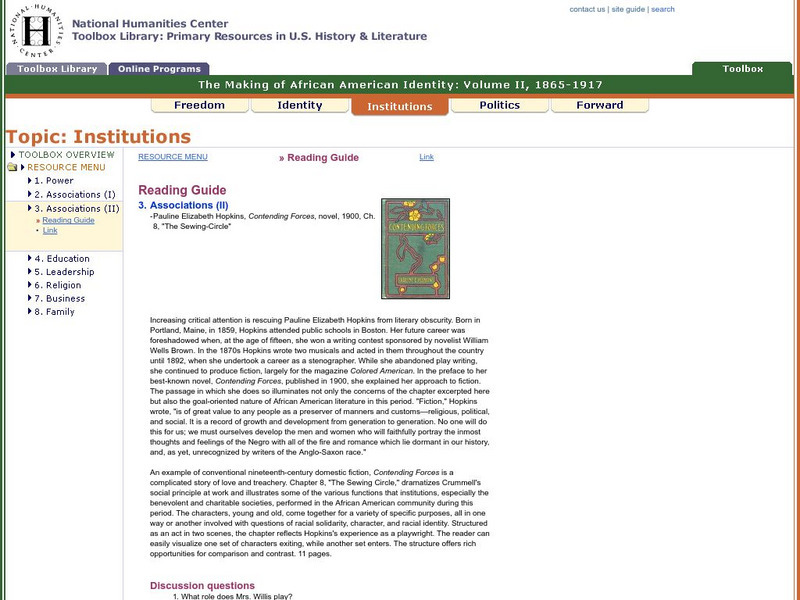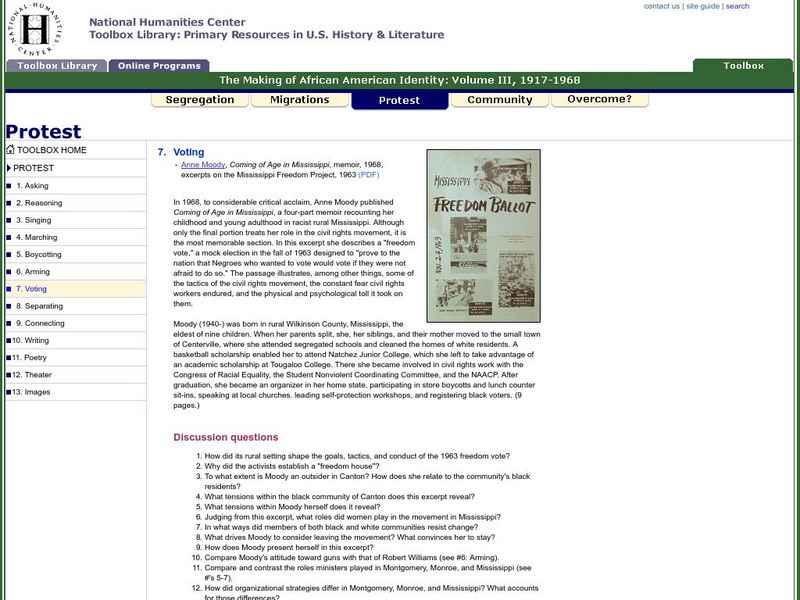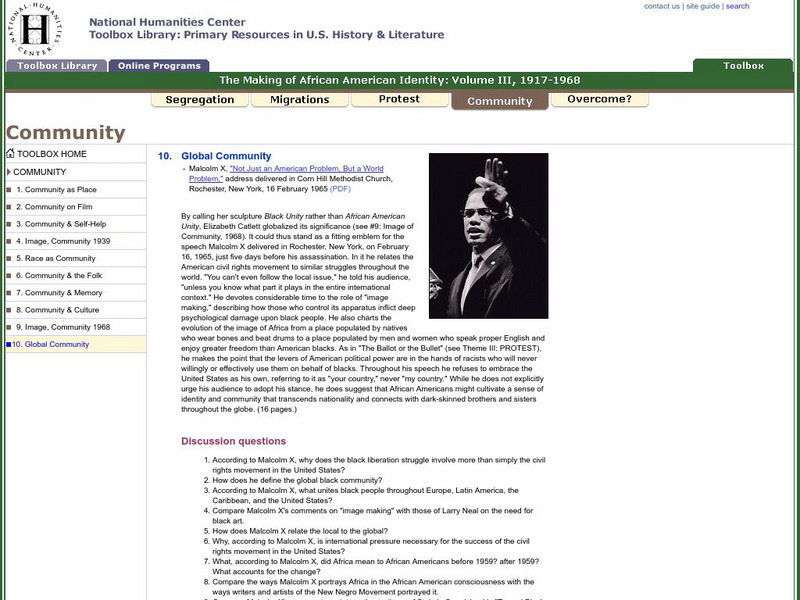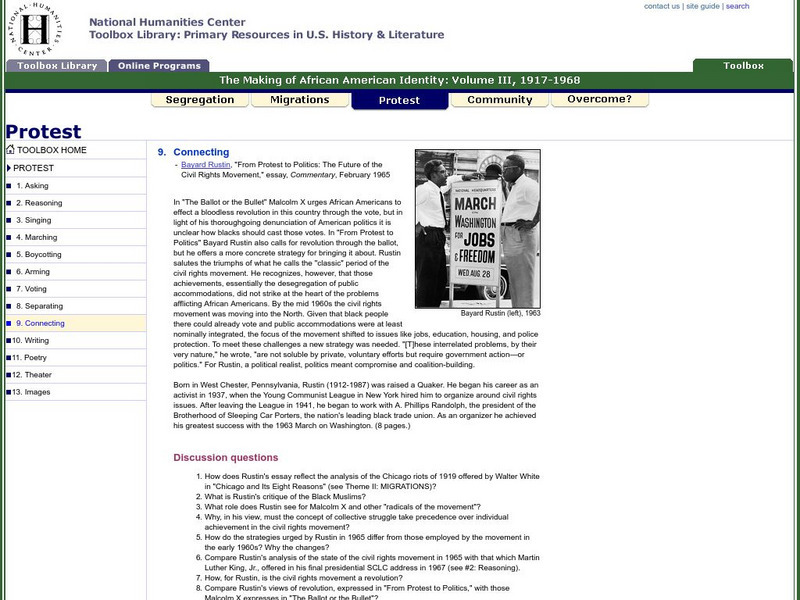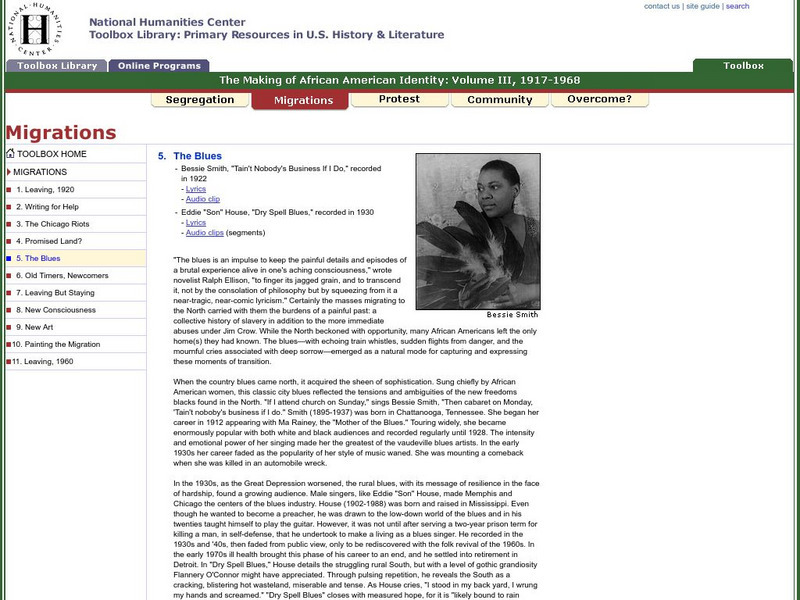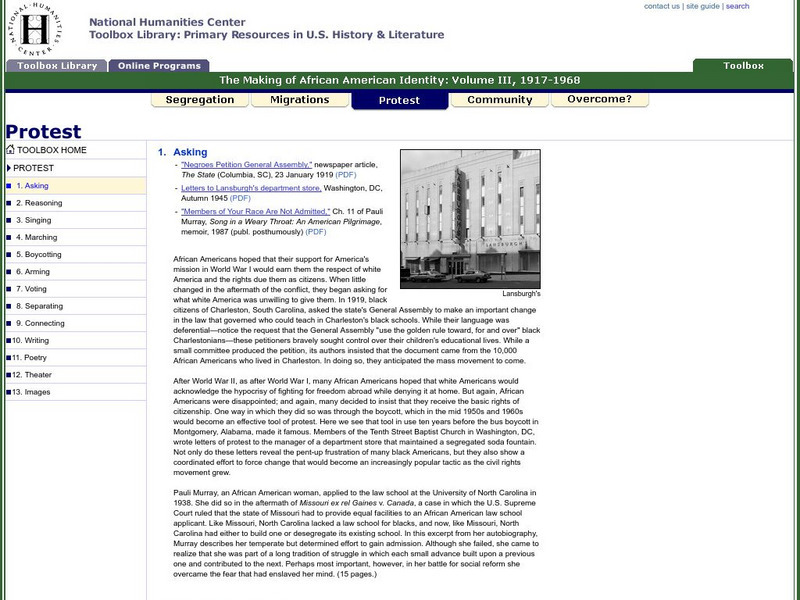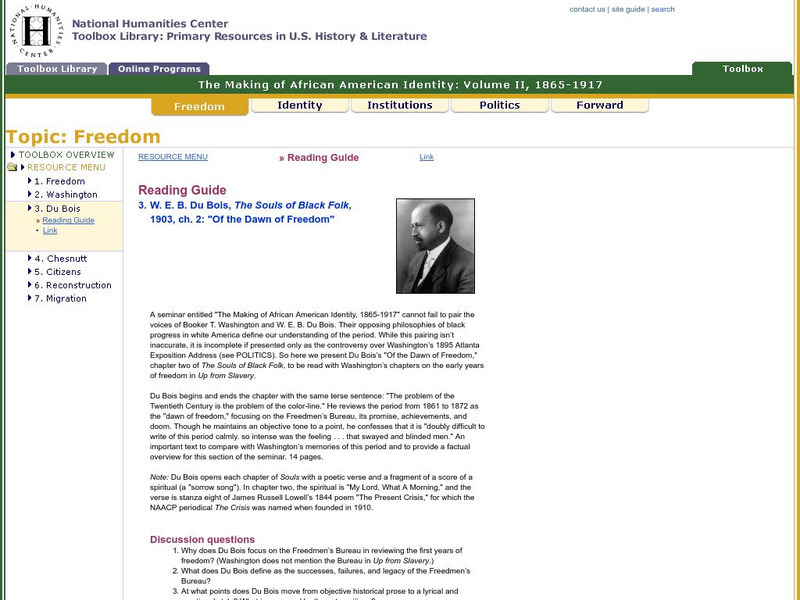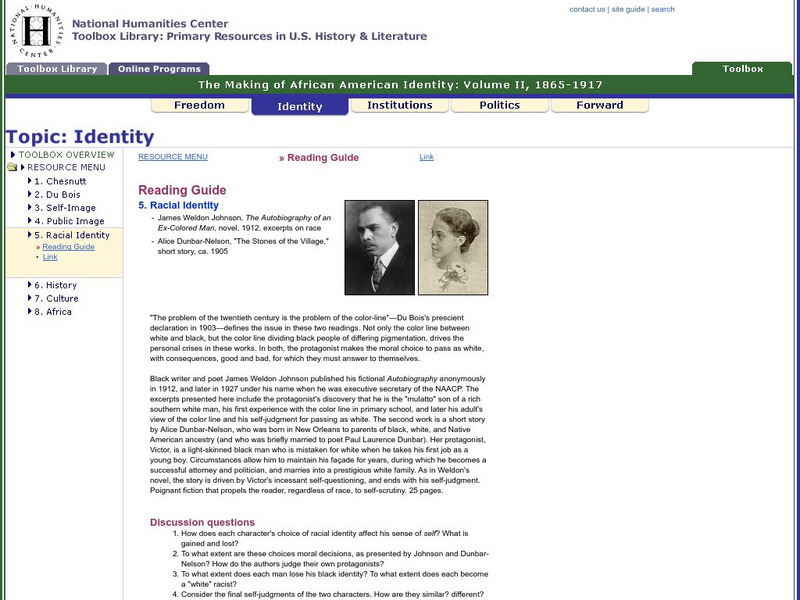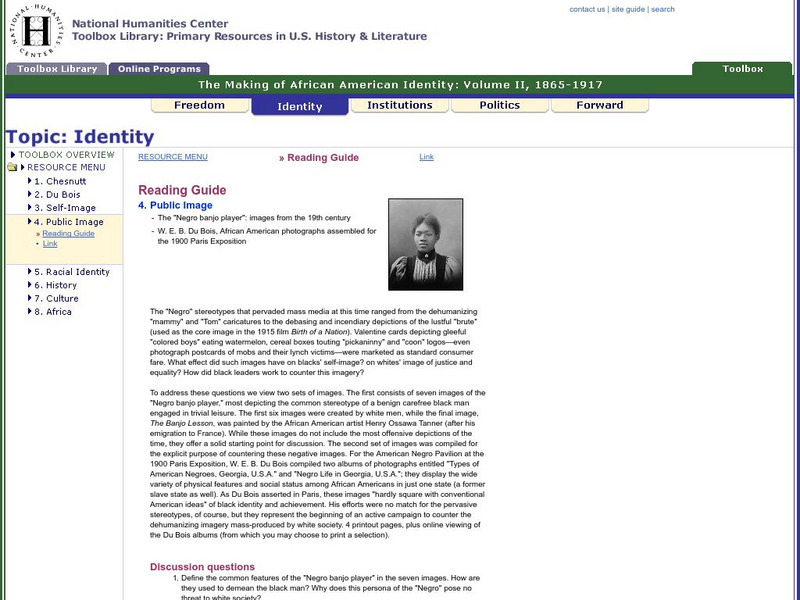National Humanities Center
National Humanities Center: Toolbox Library: Citizens: African American Identity: 1865 1917
Discusses the efforts of African Americans to be recognized as equal citizens after the Civil War, and the 13th, 14th, and 15th Amendments. Includes links to supplemental information.
National Humanities Center
National Humanities Center: Toolbox Library: Poetry, Making of African American Identity: V. 3
This study of black protest poems from the early part of the twentieth century through the late sixties can provide insight into the issues African Americans faced during that time and the ways they responded to them. Works from seven...
National Humanities Center
National Humanities Center: Toolbox Library: Making of African American Identity: The Promised Land?
A short story and a painting illustrating African American perceptions of Northern cities. Rudolph Fisher's short story "The City of Refuge" and William H. Johnson's painting Moon over Harlem offer insight into life within the black...
National Humanities Center
National Humanities Center: Toolbox Library: Making of African American Identity: Old Timers, Newcomers
An editorial cartoon and a newspaper article illustrating the tensions between members of established African American communities in the North and Southern migrants. Links to both resources are provided within this site.
National Humanities Center
National Humanities Center: Toolbox Library: Associations (I), Making of African American Identity: V. 2
Newspaper articles that illustrate how benevolent and charitable societies fostered racial solidarity among African Americans in late-nineteenth-century America are provided. Links to these articles can be found on the second page.
National Humanities Center
National Humanities Center: Toolbox Library: History, Making of African American Identity: V. 2
An art exhibit and a chapter that illustrate African American efforts to create a usable past. Aspects of African American history, character, and potential are illustrated within this resrouce through Edward Johnson's promotion of...
National Humanities Center
National Humanities Center: Toolbox Library: Citizenship, Making of African American Identity: V. 1
Public addresses, letters, and narratives about the absence of and the need for citizenship rights for African Americans. Links to resources used to lobby for equal rights are provided at the top of the page.
National Humanities Center
National Humanities Center: Toolbox Library: Associations (Ii), Making of African American Identity: V. 2
Chapter from a novel that describes the workings of a charitable society. This chapter, "The Sewing Circle," illustrates some of the various functions that institutions, especially the benevolent and charitable societies, performed in...
National Humanities Center
National Humanities Center: Toolbox Library: Freedom: Charles W. Chesnutt: African American Identity
Short story that explores the cultural and linguistic resources that sustained African Americans in the first years of freedom. This resource focuses on Charles Chesnutt and the influence he achieved by writing about race for a white...
National Humanities Center
National Humanities Center: Toolbox Library: Voting: Making of African American Identity: V. 3
The efforts to secure African American voting rights in Mississippi are described within this resource. Anne Moody's, "Coming of Age in Mississippi", a four-part memoir recounts her childhood and young adulthood in racist rural Mississippi.
National Humanities Center
National Humanities Center: Toolbox Library: Global Community, Making of African American Identity: V. 3
On February 16, 1965, in Rochester, New York, Malcolm X delivered a speech that placed African American in a global black community. Just five days before his assassination, he relates the American civil rights movement to similar...
National Humanities Center
National Humanities Center: Toolbox Library: Connecting: Making of African American Identity: V. 3
An article that makes a case for black engagement with the American political system. This resource provides a link to Bayard Rustin's "From Protest to Politics", where he encourages African Americans to begin a "revolution through the...
National Humanities Center
National Humanities Center: Toolbox Library: Making of African American Identity: The Blues
Examples of the blues inspired by the African American migration to Northern cities. These lyrics and audio clips explores the reasons for, and effects of, these migrations.
National Humanities Center
National Humanities Center: Toolbox Library: Asking, Making of African American Identity: V. 3
Attempts by African Americans to petition for their civil rights are described within this resource. This include attempts by the black citizens of Charleston to ask for civil rights by petition rather than demand them with protest.
National Humanities Center
National Humanities Center: Toolbox Library: W. E. B. Du Bois, Making of African American Identity: V. 2
Chapter in which W. E. B. Du Bois examines the state of African Americans between 1861 and 1872. He reviews the period from 1861 to 1872 as the "dawn of freedom," focusing on the Freedmen's Bureau, its promise, achievements, and doom.
National Humanities Center
National Humanities Center: Toolbox Library: Racial Identity, Making of African American Identity: Vol 2, 1865 1917
A chapter from a novel and a short story that explore the phenomenon of passing. These works examine the self-judgment and scrutiny often invoked upon oneself as a result of belonging to more than one race.
National Humanities Center
National Humanities Center: Toolbox Library: Making of African American Identity: Public Image
The resources examines images that illustrate and challenge black stereotypes of the late-nineteenth century, primarily focusing on W. E. B. Du Bois' African American photographs assembled for the 1900 Paris Exposition.
National Humanities Center
National Humanities Center: Toolbox Library: Popular Culture, Making of African American Identity: V. 2
A sculpture, poster, poem, and a painting that challenge black stereotypes in the early-twentieth century. Links to these precursors to the Harlem Renaissance are provided at the top of the page.
National Humanities Center
National Humanities Center: Toolbox Library: Africa, Making of African American Identity: V. 2
Photographs and an address that illustrate the role Africa played in black identity in the late-nineteenth century. This article compares Rev. Henry McNeal Turner's "back to Africa" campaign with the Exoduster migration to Kansas led by...
National Humanities Center
National Humanities Center: Toolbox Library: Racial Politics, Making of African American Identity: V. 2
Chapter from a novel and images that illustrate black political action in late-nineteenth-century America. Frances Harper's 1892 novel Iola Leroy, is examined, covering topics of white supremacy and racial justice.
National Humanities Center
National Humanities Center: Toolbox Library: Making of African American Identity: Migrations: Negro Migration During War
An analysis of the reasons why blacks moved north around the time of World War I. An article by Emmett J. Scott (1873-1957), who for a time served as Booker T. Washington's personal secretary, is linked to this resource.
National Humanities Center
National Humanities Center: Toolbox Library: Mutual Benefit, Making of African American Identity: V. 1
Four documents establishing black mutual assistance and self-help organizations from the late-eighteenth and early-nineteenth centuries. A link to each document is provided.
National Humanities Center
National Humanities Center: Toolbox Library: Segregation Separation: Making of African American Identity: V. 3
This resource summarizes and links to primary source articles examining the relationship between segregation and racial separation highlighting some of the effects of segregation on the black community post World War I.
National Humanities Center
National Humanities Center: Toolbox Library: Making of African American Identity: Segregation: Antilynching Dramas
Brief plays by Georgia Douglas Johnson that protest lynching are examined within this resource. Links to each play are provided in addition to a series of questions for discussion.
